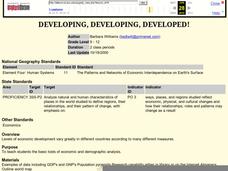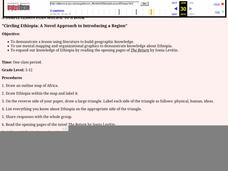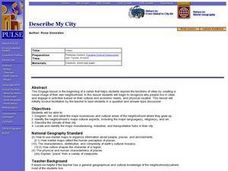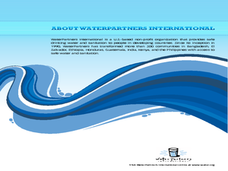Curated OER
Developing, Developing, Developed!
Students differentiate among and explain various levels of economic development around the world. They see that levels of economic development vary greatly in different countries according to many different measures.
Curated OER
Circling Ethiopia: A Novel Approach to Introducing a Region
Students read a novel to gain insight into a different region of the world. Using a graphic organizer, they share the information they have already gathered about Ethiopia. They draw an outline map of Africa and read the opening pages of...
Curated OER
Buying in Bulk
Students investigate buying purchases in bulk. In this buying in bulk lesson, students consider ways to cut costs and reduce waste in landfills by making bulk purchases.
Curated OER
Multinational Corporation Relocation
Students examine and analyze the concept of why multinational corporations relocate production facilities from developed nations to less developed nations. They explore the patterns and networks of economic interdependence incorporating...
Curated OER
Rainforest
Students examine how important the rainforest and its resources are for our everyday survival in the future.
Curated OER
2.0 "Water Is Life" Global Water Awareness Mini-Unit (Grades3-5)
Students study the amount of potable water on the Earth. For this water lesson, students examine the amount of potable water as compared to all the water on the Earth. They discuss why many parts of the world do not have access to good...
Curated OER
A River, Dead or Alive: Native Americans and European Colonists' Treatment of a River
Students write an expository paragraph about the uses of the Nashua River for the Native Americans and the European Colonists. In this river uses lesson plan, students determine the causes and effects of both parties using the river.
Curated OER
Sticks, Stones, Sinews and Stuff: How Early People Used the Environment to Meet Basic Needs
Students create an artifact. In this early survival lesson, students use found objects to create an artifact that could have been used to help early people meet their basic needs.
Curated OER
Recycle, Reduce, Reuse and Save a Tree
Young scholars examine how to save and protect trees. For this conservation lesson, students read books about the usefulness of trees, write ideas in their journals about how trees can be used, and make a book of ways to protect trees.
Curated OER
The Cherokee: Trail Where They Cried
Students read the Trail of Tears about the Cherokee Nation removal and write a letter pretending they are the grandparent of a Cherokee child. In this Trail of Tears lesson plan, students understand the changing of boundaries.
Curated OER
Exploring Canadian Cities - a Day To Remember
Students research information on the geographical features, climate, and cultural activities of a Canadian city. They plan a day in the city with a schedule of activities. They synthesize information and create a large poster about the...
Curated OER
Microclimates of Our School
Students read the story "Weslandia" by Paul Fleischman, define the term microclimate, gather and record data in various places on school grounds to establish the presence of difference microclimates, analyze and compare microclimates,...
Curated OER
Describe My City
Students explore the functions of cities by creating a visual image of their own neighborhood. Students diagram, list, and label the major businesses and cultural areas of the neighborhood where they grew up, then write a letter to a...
Curated OER
Wattle and Daub Using Natural Resources to Survive
Seventh graders create list of materials that family of four would need to live and survive in the forest, identify four natural resources used by Cherokee Indians to build shelter, create poster that depicts Cherokee hamlet in summer or...
Curated OER
Create a City: An Urban Planning Exercise
Students explore the effects of population growth in Arizona. In this history activity, students work in small groups to create a "perfect" city. Activities include examining the Arizona census results then discussing the importance of...
Curated OER
Louisiana
Third graders study factual information about Louisiana including the state flag, bird, tree, and important geographical points using the Internet and maps. They explain the different groups that settled the state in this mini-unit.
Curated OER
Walking For Water
Young scholars investigate how third world countries get their water. In this water instructional activity, students research how countries like Kenya and Ethiopia get their water supply. Young scholars participate in an experiment to...
Curated OER
Comparison of hometown life with that of life in a Canadian city
Students research cultural characteristics of a Canadian city with that of their home town. They complete a map handout, providing the relative location on a large map and the absolute location on a provincial map. Students work together...
Curated OER
Where is the Trail? The Journey of Lewis and Clark
Students explore the trail followed by Lewis and Clark on their journey across the United States. In this United States History lesson, students complete several activities to establish the Lewis and Clark Expedition, including a class...
Curated OER
It's Just a Barn
Investigate Pennsylvania Barns. Have your class consider the elements common to Pennsylvanian barns and why they are significant to the food production process. They write summaries of Frederick Watts and his impact on agriculture.
Curated OER
Dangers of the West
Eighth graders explore the American West. In this Westward Expansion lesson plan, 8th graders examine primary sources to investigate the dangers travelling to and settling in the American West. Students design brochures that would help...
Curated OER
Religion and the Environment
Students consider the role of environmentalists in the United States. In this political issues lesson, students compare and contrast the evangelical vote in the U.S. with the liberal vote as they read selected articles and watch Moyers...
Curated OER
Lewis and Clark and Native Americans, Part II
Students research the Native Americans living in the regions explored by Lewis and Clark. They identify the modern-day names of sites claimed by the Lakota Indians, and create a poster of the original Native American names.
Curated OER
Understanding Latitude, Longitude, and Time Zones
Students take an imaginary world tour by locating cities with latitude and longitude. They plan an itinerary and calculate the time zones from which they would call home. Then they construct word problems involving travel across time zones.

























